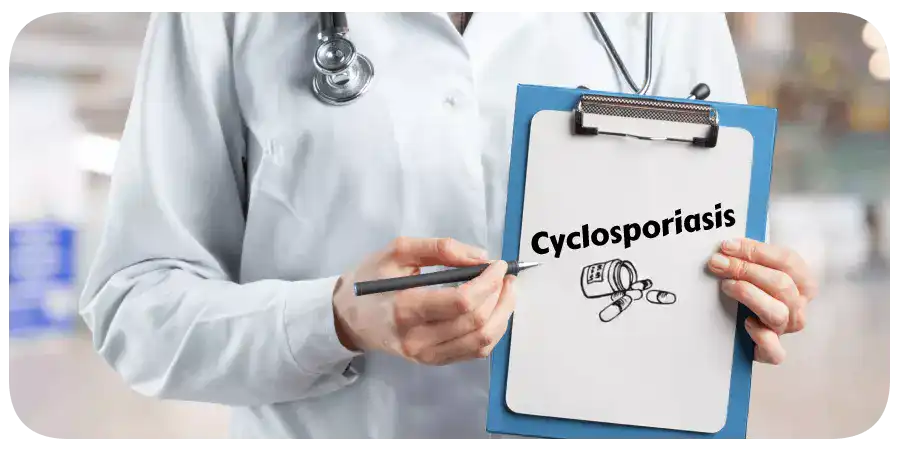Cyclosporiasis is an acute intestinal infection caused by a unicellular parasite called Cyclospora cayetanensis. This parasitic infection occurs by consuming food or water that has been contaminated with this pathogen. A minuscule parasite, Cyclospora cayetanensis, is composed of just one cell, too small to be seen without a microscope. It causes food and water-related gastrointestinal illness, watery diarrhea, and other intestinal health issues. The symptoms of this illness can be intermittent or may even last for many weeks or even months. Cyclospora infection can be mild or very serious, depending on the individual’s health state. The risk and severity of this infection can be intense in case the person has a weak immune system.
Causes Of Cyclosporiasis
First reported in 1979, the whole host range of this microscopic, spore-forming, intestinal protozoan parasitic infection, also referred to as traveler’s diarrhea is still unknown. Presently, humans are the only known host, with chimpanzees and a few other primates thought to be potential carriers. Primarily Cyclospora is spread by people ingesting something or spread by the fecal-oral route, meaning through the consumption of food or water contaminated by feces. Contaminated fruits and vegetables also cause cyclospora infections.
During infection, some of the parasitic cells undergo a reproductive stage where survival structures called oocysts are produced which can survive in adverse moist conditions for long periods. These structures eventually spread the infection to other new hosts, and after being passed in a bowel movement, they become infectious, and the infection needs more than a week to affect the body. Persons of all ages and people living or traveling in tropical or subtropical regions may be at increased risk for infection. More often, the chances of Cyclosporiasis getting passed on from one person to another are remote.
Onset Of Cyclosporiasis Symptoms
Not considered fatal, this disease usually is termed as ‘self-limiting,’ presumed that symptoms will wither away in a few days. While a person can be infected and have no symptoms, most likely, the symptoms begin approximately a week after exposure to the parasite. In some cases, symptoms may continue for more than a month, and at times there can be a relapse as well. Some patients can also be asymptomatic. In severe cases, symptoms can last more than a month, which happens if the ailment is left untreated.
Here is the list of the most common symptoms of Cyclosporiasis:
- Watery loose motions and many episodes of explosive diarrhea
- Feeling of extreme bloating and gas in the body
- Abdominal cramps and flatulence
- Loss of appetite
- A low-grade fever
- Extreme fatigue
- Achy muscles
- Intermittent weight loss
Complications
Cyclospora can cause a variety of chronic complications if left untreated and if the infection is severe, such as malabsorption, reactive arthritis, and inflammation of the gallbladder, dehydration, particularly in infants who are at the greatest risk of severe and fatal dehydration. Extraintestinal infection and further complications can also appear in individuals who have a weak or compromised immune system.
Diagnosis Of Cyclospora Infection
Identifying the parasite is made by specific laboratory tests and examining stool specimens. Several stool samples may be needed to confirm a Cyclospora infection. The patient may be asked to submit more than one specimen from different days of stool samples for the presence of developmental stages of the Cyclospora parasite. Doctors recommend the collection of multiple stool samples over a few days to identify the onset and spread of the disease microscopically.
Treatment
Cyclosporiasis is treated with antibiotics, anti-diarrheal medications, and special hydration fluids to help the body rehydrate itself. Fluids to restore essential electrolytes may also be given. Moreover, the doctors recommend drinking plenty of soups, broth, sports drinks, and oral rehydration solutions.
Prevention
Proper food handling can reduce the risk of any pathogen-borne infection. Here are the best ways that can help to prevent the occurrence and spread of Cyclosporiasis:
- Avoid food or water that might have been contaminated with stool may help prevent this infection
- Wash hands with soap and warm water before and after handling or preparing fruits and vegetables
- Clean vegetables and fruits under fresh running water before cooking them or eating them raw
- Refrigerate all the cut, peeled, or cooked fruits and vegetables whenever not in use
- Store fruits and vegetables away from raw meat and poultry




